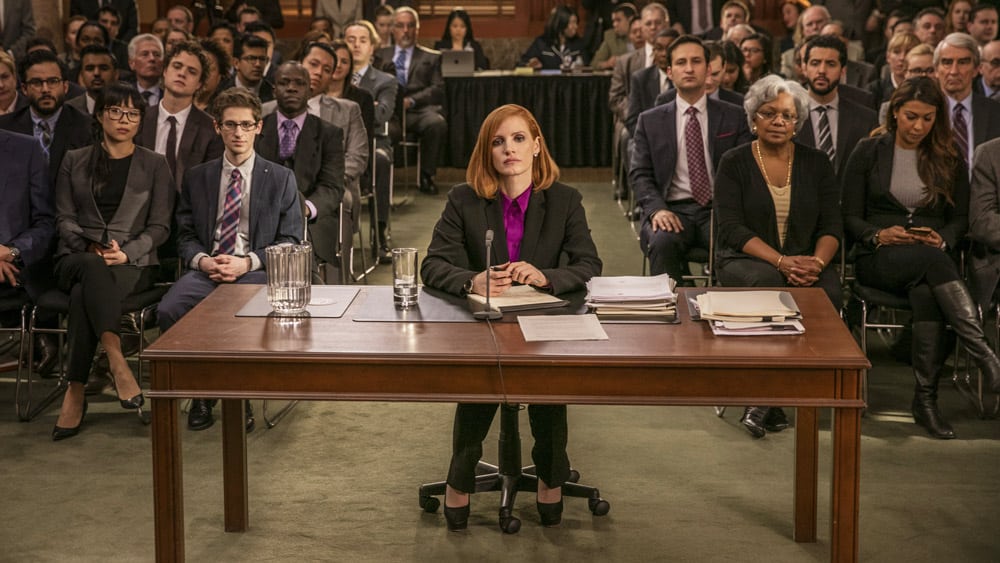In Miss Sloane, Elizabeth Sloane, one of the most revered lobbyists in Washington, takes on her greatest opponent yet; the gun lobby.
Miss Sloane embodies many of the strengths of a great political thriller, while doing away with the trite and tired platitudes that often relegate films of this genre to ‘made for TV movie’ status. The plot is intricate, but no so much that it becomes unwieldy. Each time Miss Sloane appears to be teetering on the edge of convolution or absurdity, it is reigned back in; sometimes by clear and engaging storytelling, but usually by the strength of the lead performance.
Jessica Chastain is the element that elevates this film above what it could have been; a sleek but dry genre piece, without an anchor and without emotion. All of the film’s flaws are forgivable by the grace of Chastain’s portrayal of Elizabeth Sloane, and all of its achievements are heightened by the complexity she brings to what could have easily been a dull archetype. The portrayal of Elizabeth Sloane’s character is elevated further by her interaction with her colleague, Esme. Gugu Mbatha-Raw plays Esme as the antithesis of Elizabeth, yet manages to avoid the boring conventions audiences are typically forced to endure when two characters with different world views are thrust together. Rather than a constant butting of heads or bickering being used to explore their differences, Elizabeth and Esme are constantly striving towards the same goal. It is the means by which they try to achieve this goal that divides them. Where Esme chooses honour, Elizabeth chooses victory, despite the cost it may have.

The interplay between the two is the foundation of the film. Without the authenticity of their relationship and their characters as individuals, some of the film’s reveals and realisations may have seemed preposterous. But the earnest performances ground the story in what almost feels like reality. Combine this with the beautiful costuming and production design, and it becomes easier and easier to ignore some of the over-the-top developments that unfold in the film’s third act.
Miss Sloane also lightly touches on interesting questions of morality. Primarily, whether the ends justify the means. Where other films may seem heavy handed in their exploration of such themes, it is again Chastain’s character that brings nuance and intrigue to this question. While she is imbued with many stereotypically masculine traits (a cold nature, a desire to win, an addiction to her work) she is allowed to keep her emotions. The conflict within her is clear on her face, and she is often shown to be vulnerable while still remaining a feared and respected authority. The interaction between these two sides of Elizabeth typify the conflict in the character and ultimately, the film itself. Can her actions be forgiven for the sake of her cause, or is the harm she is doing to others too great a price to pay for winning?
Fun Fact:
Director John Madden gave the screenplay to actress Jessica Chastain personally. He had only her in mind for the role after he read the spec script. Madden had previously directed Chastain in the film The Debt (2010).




COMMENTS